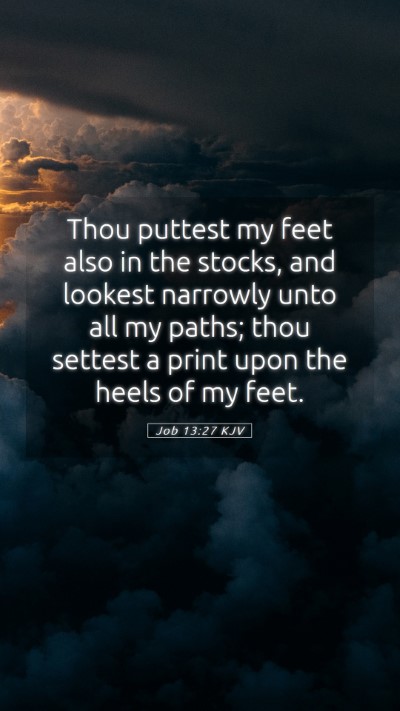Old Testament
Genesis Exodus Leviticus Numbers Deuteronomy Joshua Judges Ruth 1 Samuel 2 Samuel 1 Kings 2 Kings 1 Chronicles 2 Chronicles Ezra Nehemiah Esther Job Psalms Proverbs Ecclesiastes Song of Solomon Isaiah Jeremiah Lamentations Ezekiel Daniel Hosea Joel Amos Obadiah Jonah Micah Nahum Habakkuk Zephaniah Haggai Zechariah MalachiJob 13:27 Meaning
What is the meaning of Job 13:27?
Thou puttest my feet also in the stocks, and lookest narrowly unto all my paths; thou settest a print upon the heels of my feet.
Job 13:27 Bible Verse Meaning
Understanding Job 13:27
Job 13:27 states: “Thou puttest my feet also in the stocks, and lookest narrowly unto all my paths, and the setest a print upon the heels of my feet.” This verse reveals profound aspects of Job's suffering, his relationship with God, and the existential questions regarding divine justice and human suffering.
Bible Verse Commentary
This passage, set within the context of Job's dialogue with his friends and ultimately, God, touches upon themes of surveillance, scrutiny, and accountability. Job experiences deep anguish, feeling as if he is being scrutinized under a magnifying glass by the divine.
-
Matthew Henry's Commentary:
Matthew Henry notes that Job feels as though he is being aggressively monitored by God. The 'stocks' symbolize restriction and humiliation, suggesting that Job perceives himself as imprisoned not just physically, but emotionally and spiritually. Henry emphasizes that Job's lamentation showcases his desire for a fair hearing before God, notwithstanding the overwhelming feeling of being trapped in his afflictions.
-
Albert Barnes's Commentary:
Albert Barnes expounds that Job’s predicament reflects the broader human conditions of suffering and divine oversight. He interprets Job's words as an expression of an intense longing to demonstrate his integrity before God. Barnes further explains that Job's assertion of being closely watched by God serves as an acknowledgment of divine omniscience, highlighting both awe and despair in Job's heart.
-
Adam Clarke's Commentary:
Adam Clarke focuses on the metaphorical implications of the ‘print upon the heels,’ suggesting that Job feels that his every step is marked and judged. Clarke contextualizes this scrutiny as part of the trials Job faced, emphasizing how such experiences of suffering often leave lasting impressions on one's spirit. This reflects on the nature of trials in the believer's life.
Biblical Exegesis and Themes
Job’s words in this verse encapsulate a struggle that resonates throughout Scripture—the feeling of being overwhelmed by circumstances while longing for understanding and accountability. The themes present are vital for in-depth Bible verse analysis and interpretations.
- Surveillance of God: Job’s assertion conveys both fear and respect regarding divine oversight. It prompts a deeper inquiry into human existence and the nature of God’s interventions.
- The Concept of Justice: The notion that Job feels unjustly punished invites reflections on the problem of suffering. This aspect encourages believers to wrestle with similar questions relating to justice, suffering, and God's intentions.
- Accountability: Job’s desire to present his case to the Almighty speaks to a fundamental human desire for fairness in one’s plight, raising questions on how God perceives our actions and misfortunes.
Practical Applications
The insights gleaned from Job 13:27 enable us to relate our personal tribulations to biblical teachings. The Scripture analysis encourages believers to engage deeply with their discomforts and seek understanding through prayer and study.
- Bible Study Groups: This verse can serve as a focal point for discussions within Bible study groups, where participants can share personal experiences of suffering and explore divine justice.
- Online Bible Study: Utilizing online Bible study tools, this verse can facilitate discussions on suffering and God’s perceived scrutiny in our lives, enabling greater community and shared insights.
- Applying Scripture: Believers can wrestle with their sufferings by reflecting on Job's journey, drawing parallels to their lives, and finding strength in God’s unfailing presence.
Related Bible Cross References
- Psalm 139:1-4: This psalm speaks to the omnipresence and omniscience of God, similar to Job’s acknowledgment of being observed.
- Hebrews 4:13: This verse asserts that nothing is hidden from God, reinforcing the notion of divine scrutiny present in Job’s words.
- Proverbs 15:3: “The eyes of the Lord are in every place, keeping watch on the evil and the good,” which resonates with the theme of divine observation found in Job 13:27.


